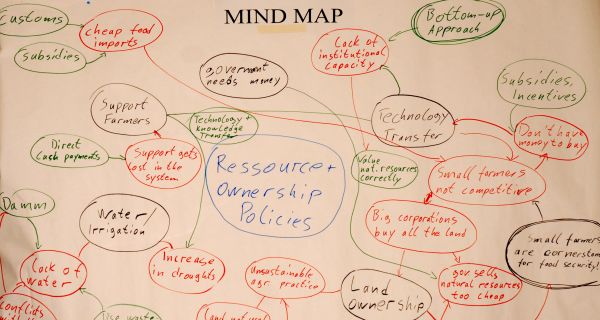Water scarcity, deforestation, the GM-food debate – in times of dwindling resources and growing populations, agriculture is at the centre of the debate. Every year 1.3 billion tonnes of food are wasted worldwide. Forty international horticulture students from around the world, along with 30 guests, addressed this topic at the Millennium Express workshop “Let’s Feed the World” at the Leibniz Universität Hannover.
Students from 11 Master’s and PhD programmes discussed whether, and under which conditions, sustainable agriculture can provide worldwide food security. First came input from experts from the area of development cooperation. They spoke about ongoing projects such as soil improvement efforts in corn and rice cultivation in Tanzania, or problems with food waste related to the value chain in potato cultivation in Kenya.
Looking for Solutions
Workgroups addressed concrete approaches to solutions, posing several questions in the process: Is biotechnology an appropriate motor for increased agricultural production? Is it possible to unite fair trade with an even distribution of food resources and adequate incomes for producers? How can a limited pool of natural resources be used optimally? And what must politicians do in order to fight world hunger?
Monica Santosa from Indonesia studies Agricultural Sciences and Resource Management in the Tropics and Subtropics at the University of Bonn. She found the discussion among the participants from varying disciplines exciting. “It is not a simple matter to bring together industry and development work and to do justice to them both,” she points out. “Too many factors come into play.” When it comes to water management in Africa, for example, the technical capability of the farmers themselves is more important than the technical possibilities. Until they have the know-how, they cannot employ the technology in a way that makes sense.
For Saima Jaibeen, who studies Agricultural Economics at the University of Hohenheim, the workshop provided practical help for her doctoral dissertation, which focuses on the ecological costs of agriculture. Jaibeen, who comes from Pakistan, has faced problems with data acquisition and evaluation. “Thanks to the workshop in Hanover, I am now in contact with a scientist who can help me.”
Industry Gets Involved
On the second day of the workshop, an excursion to WeserGold was on the agenda. The large beverages producer has roots in the region, but has turned its attention to the international market. The students were especially interested in the marketing channels as well as the communication between the European company and one of its branches in Costa Rica. They also wanted to know what the company has done to makes its supply chain sustainable. Here, as well, it became clear how food scarcity is tied to both sales and political conditions. Large distribution chains are demanding a reduction in the printed shelf life of juices to nine months, even though the producer guarantees one year. Such practices lead to increased food waste, and are therefore no longer allowed in certain countries.
The workshop in Hanover showed just how dense the food production matrix is, and the importance of clearly illuminating the interdependencies among all the individual factors.
More impressions from the workshop in our image gallery on facebook
Millennium Express Workshop Hannover 2012 – WANTED: Food security for all








